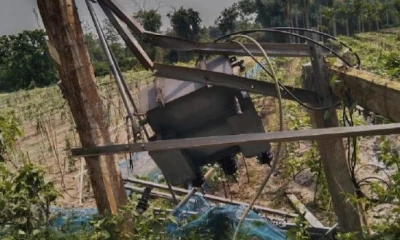A fierce thunderstorm battered Tripura on May 2, leaving in its wake a trail of destruction that included power infrastructure worth Rs 1.22 crores. The tempest wrought havoc, severing 166 km of crucial transmission lines, toppling 235 electric poles, and rendering 30 transformers beyond repair.
Tripura Power Department insider revealed about the extent of the damage inflicted by the relentless storm and heavy rainfall, which spanned one day. The devastation primarily impacted districts across the State, including the North District, Unakoti, Khowai, Sepahijala, Gomati, South Tripura, and Dhalai.
“A comprehensive assessment indicates that tempest tore through over 166 km of vital transmission lines, leaving behind a grim scene of destruction. A staggering count of 235 poles lay shattered, while 30 transformers suffered irreparable damage. The initial financial evaluation of the wreckage stands at an alarming Rs 1 crore 22 lakh,” stated the insider.
The Tripura State Electricity Corporation, confronted with the enormity of the crisis, swiftly mobilised its workforce, reinforced by additional labourers, to initiate the restoration process.
“Engineers and technicians are working tirelessly, grappling with logistical hurdles to accelerate the restoration efforts. The corporation appeals for the cooperation of the affected populace in these collective efforts,” added the insider.
Highlighting efforts to expedite recovery, Power Minister Ratan Lal Nath convened a crucial meeting with senior officials of the State Electricity Corporation.
“Minister Nath stressed the urgency of the situation, urging the mobilisation of all available resources, including manpower and vehicles, to promptly reinstate services to affected regions. While progress has been made in some areas, challenges persist elsewhere, with fallen trees and damaged infrastructure hindering restoration efforts,” noted the insider.
Managing Director Debashis Sarkar acknowledged the challenges involved, citing the time-consuming process of clearing fallen trees and repairing damaged power lines. Nevertheless, he expressed optimism that barring further adverse weather, normalcy would soon return.
“Priority has been accorded to restoring power lines for essential services, including hospitals and drinking water sources,” Sarkar added.

















